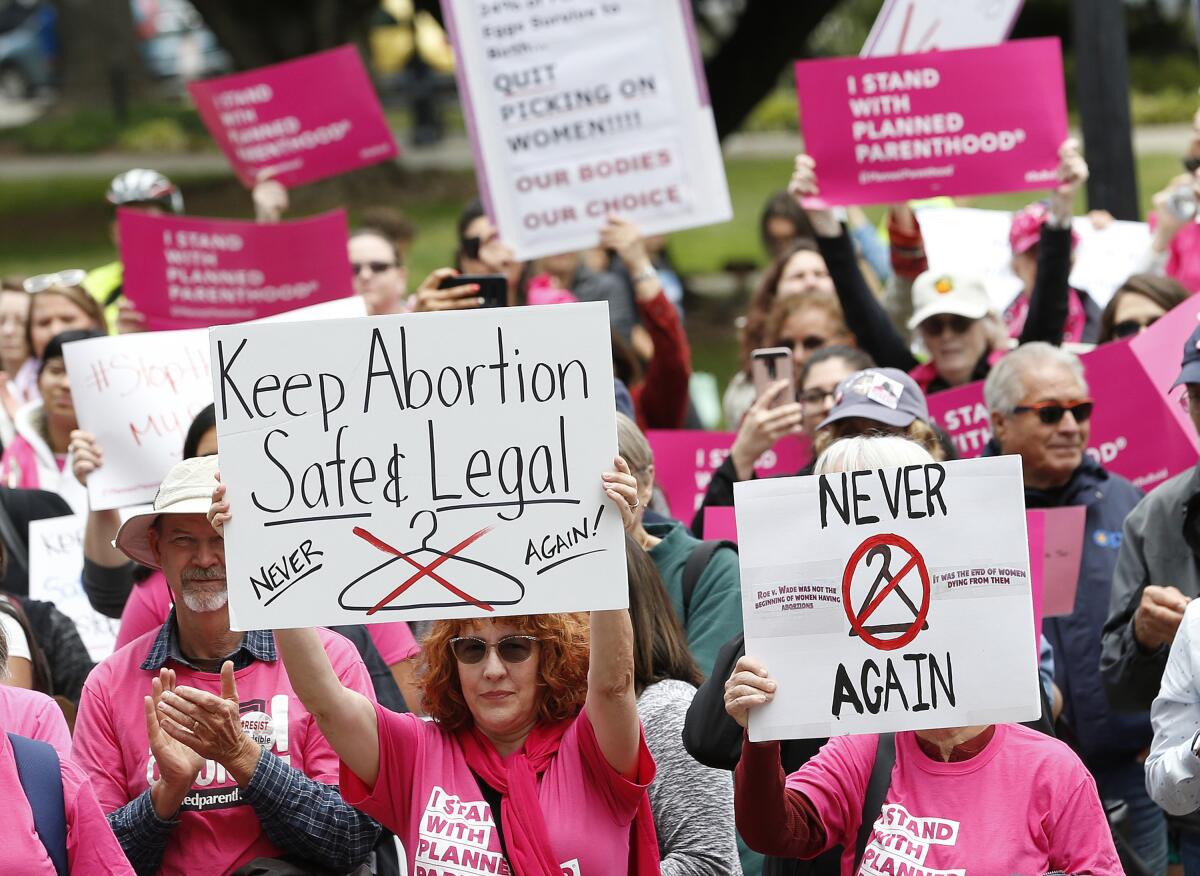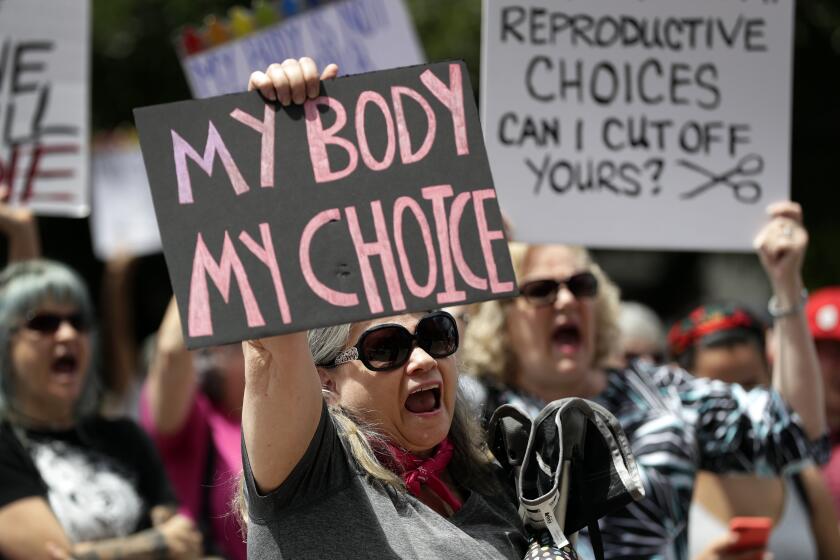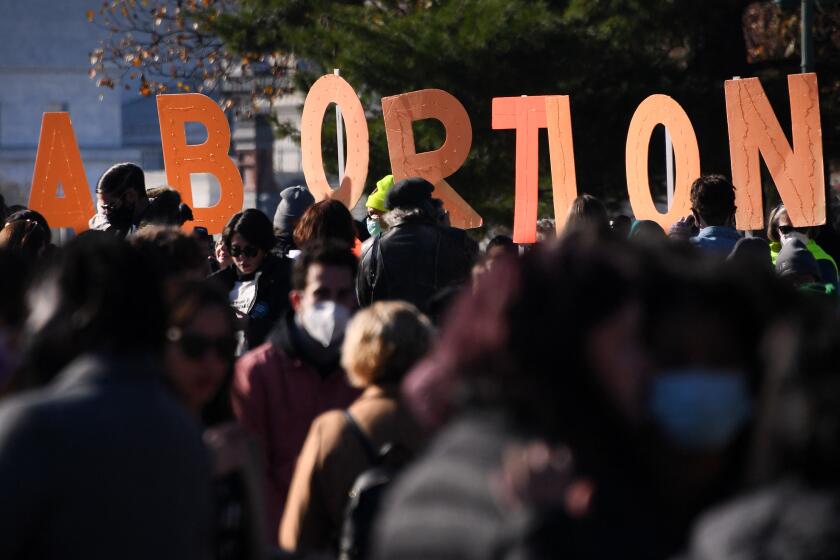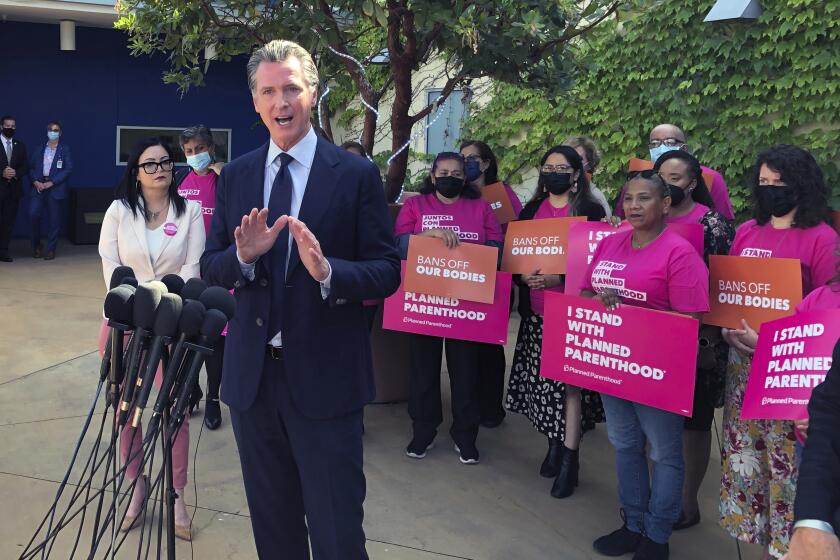California leaders move to enshrine abortion, contraceptive rights in state Constitution

- Share via
SACRAMENTO — Democratic legislative leaders, hoping to solidify the long-term right in California to abortions and contraceptives, have introduced a bill asking voters to enshrine those protections in the state Constitution.
Senate Constitutional Amendment 10, introduced Wednesday by Senate President Pro Tem Toni Atkins (D-San Diego), is the latest countermeasure from California Democrats to the expectation that the U.S. Supreme Court is poised to overturn Roe vs. Wade, the 1973 landmark decision that bars states from criminalizing the procedure.
For the record:
9:22 a.m. June 8, 2022An earlier version of this article said the constitutional amendment legislation needs the governor’s signature to be placed on the ballot. It does not, as only approval of the California Legislature is required.
Atkins’ amendment would not expand California’s already progressive reproductive healthcare laws that ensure a woman’s right to abortion and birth control, including the rights of minors to access services without parental notification or consent. However, she said the relentless challenges to abortion access in other states made it clear to her that California’s case law and statutory laws may not be enough.
“This is a healthcare decision,” Atkins said. “And we should look at it as such. ... You don’t always think about needing this until you need it. And that’s maybe the privilege we’ve had for 50 years, but now a whole generation of women are going to have to think about it and particularly those that don’t live in California or states like California.”
The timeline for the passage of SCA 10 is tight. The proposal must pass the state Senate and Assembly with two-thirds approval in each house before the
June 30 deadline to place a measure on the November statewide ballot. Democrats hold enough seats in both houses to pass the amendment without Republican support.
Gov. Gavin Newsom, Atkins and Assembly Speaker Anthony Rendon (D-Lakewood) announced that they would seek the constitutional amendment last month. Atkins and Rendon are co-authors of the bill, along with dozens of other Democrats.
“California will not stand idly by as women across America are stripped of their rights and the progress so many have fought for gets erased,” Newsom said in a written statement co-signed by Atkins and Rendon. “We will fight.”
California’s Constitution includes broad rights of privacy but has no explicit protection for abortion services.
If the measure makes its way to the November ballot, the debate over abortion rights could boost voter turnout and be a key issue that candidates are forced to reckon with in contested statewide and legislative races. Among likely voters in the state, 76% said they did not want Roe vs. Wade overturned, according to a poll earlier this year by the nonpartisan Public Policy Institute of California.
Newsom wrote on Twitter last month that abortion rights will be “the defining issue of the 2022 election.”
Erwin Chemerinsky, dean of UC Berkeley Law, said the question of abortion access raised at the ballot box could drive voter turnout, but “that could go either way.”
“The reality is this is more symbolic than anything else,” Chemerinsky said, adding that it allows California politicians to be on record with their support for abortion access.
While other states restrict abortion and the Supreme Court weighs Roe vs. Wade, California is preparing to serve the country’s abortion patients.
The brief description of SCA 10 says the measure “would amend the California Constitution to prohibit the state from denying or interfering with an individual’s reproductive freedom in their most intimate decisions, which includes their fundamental right to choose to have an abortion and their fundamental right to choose or refuse contraceptives.”
“The California Constitution explicitly protects the right to privacy, which has been interpreted as protecting the right to abortion,” Chemerinsky said. “This constitutional amendment, therefore, would not change the law in California. It would be more explicit, so if ever there were a conservative California Supreme Court, it could not eliminate abortion rights. But the reality is that if ever there is a federal law prohibiting all abortions, it would supersede and preempt California law.”
California’s Democratic leaders began mobilizing last year in response to perceived threats to Roe vs. Wade, with Newsom asking Planned Parenthood Affiliates of California and others to develop a plan for the state to become a sanctuary to anyone denied abortion services in other parts of the country. The coalition, the California Future of Abortion Council, recommended 45 changes in December to improve access and create additional capacity should other states outlaw abortion. Lawmakers have introduced more than a dozen bills this year related to the abortion council’s recommendations.
In the upcoming session, California legislators hope to push forward Senate Bill 245, which would put an end to out-of-pocket costs paid by those seeking abortions.
One bill signed into law by Newsom in March will require health insurers licensed by the state to cover the full cost of an abortion, without a co-pay, deductible or other cost-sharing that can, on average, range from $300 for a medication abortion to nearly $900 for a procedural abortion, according to the California Health Benefits Review Program.
Jodi Hicks, president of Planned Parenthood Affiliates of California, said the recommendations from the California Future of Abortion Council prepared for a “nightmare scenario” of Roe being overturned, which she said now feels imminent.
“California does have laws that protect a person’s right to choose an abortion,” Hicks said. “What we want and unfortunately feel we need to do is give constitutional protections to ensure that whatever happens with the Supreme Court, whatever happens at the federal level or even any changes to the makeup of our state Legislature, that people’s fundamental rights are protected now and for generations to come.”
Newsom’s current budget proposal includes $125 million earmarked to expand access to abortions and to prepare for more women traveling to California for reproductive care. He also included $40 million for abortion service providers to help cover those who are uninsured. The governor and legislative leaders are expected to sign off on the basics of a new state budget next week.
The subsidies are included in a $125-million abortion services plan Newsom will send to legislators on Friday as part of his revised state budget.
Atkins said Tuesday that the proposed investments and legislative changes show the state’s commitment to being a “beacon of hope” for those who live in states enacting antiabortion laws.
“California is going to double down,” Atkins said. “We’re going to make sure we have this right solidified, and we’re going to go further than that and strengthen our foundation to provide services to Californians. We already know that women are coming here from other places to get abortions. We need to make sure that we can address the needs of Californians as well as anyone else who might come here.”
More to Read
Sign up for Essential California
The most important California stories and recommendations in your inbox every morning.
You may occasionally receive promotional content from the Los Angeles Times.















